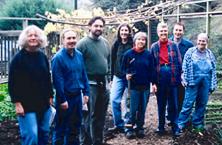| The Project Component Does Work in Environmental Ethics - Making Connections |
![PDF-NOTE: Internet Explorer Users, right click the PDF Icon and choose [save target as] if you are experiencing problems with clicking.](http://rsnonline.org/templates/rsntemplate-smallmasthead/images/pdf_button.png) |
 |
|
Page 3 of 3
The Environmental Ethics course receives pretty positive student evaluations and my perception is that the project component is functional in student learning on at least two grounds. The first is that anxiety increases as students learn more about how dysfunctional national and international economic and political policies can be from the perspective of the triple bottom line (economic, social, and ecological accounting). The project component provides a structured arena, which they themselves have created, to do something positive and perhaps effective. As Howard Clinebell has said, as we heal the earth, the earth heals us. I think he’s right. A second way the project component is functional is that throughout the assigned reading, no matter what project they choose, they begin to understand why their new skills are legitimate and contribute to a new way of living. Their new practical learning has theoretical grounding. Such integration of theory and praxis can also occur in other ways. In a recent Doctor of Ministry class focused on theological and ethical perspectives on climate change, for example, I again built in a class project. But perhaps because the class was four weeks in the summer instead of thirteen or fourteen weeks in the spring, the project component served primarily a social function. DMin students tend to choose San Francisco Theological Seminary for its location rather than its theological tilt, so the student demographic is very heterogeneous politically and theologically, and the experience of working together outside the classroom is valuable in getting to know people they otherwise might not want to know. The breakthrough in this class, however, lay in a different area. I knew some students were placed in my class and it was not their first or second choice. I anticipated resistance from some students to the premise of the class. The prospect of having to use precious summer class hours debating whether anthropogenic climate change is a valid phenomenon scientifically was something I wanted to avoid. The assignment for the first class was sent in advance to those enrolled. My assignment was to bring to the first class a two-page paper describing the effects of climate change in the city or region of their choice. All chose the city or region where they are in ministry. I suggested they type into the search bar “your city or region + climate change.” Examples would be “Seattle + climate change” or “Annapolis + climate change.” All brought two-page papers to the first class and all found some evidence of climate change in their area on the Internet. The two-page paper became the introductory paragraphs of the moral argument they were to write during their class wit ResourcesClinebell, Howard. Ecotherapy: Healing Ourselves, Healing the Earth. Minneapolis: Fortress Press, 1996. Syllabus - Environmental Ethics - Robb |


 h me, to be addressed to their congregations in whatever theological manner is appropriate for their audience. No time was spent debating whether climate change is a legitimate concern and they had a theological and ethical product to take back to their ministries. I am now a proponent of the two-page paper as a way to stimulate research on a matter that might seem daunting. This type of project can really help to cut through some of the anxiety experienced when reading about ecological crises and it can help connect theory and praxis even further.
h me, to be addressed to their congregations in whatever theological manner is appropriate for their audience. No time was spent debating whether climate change is a legitimate concern and they had a theological and ethical product to take back to their ministries. I am now a proponent of the two-page paper as a way to stimulate research on a matter that might seem daunting. This type of project can really help to cut through some of the anxiety experienced when reading about ecological crises and it can help connect theory and praxis even further.